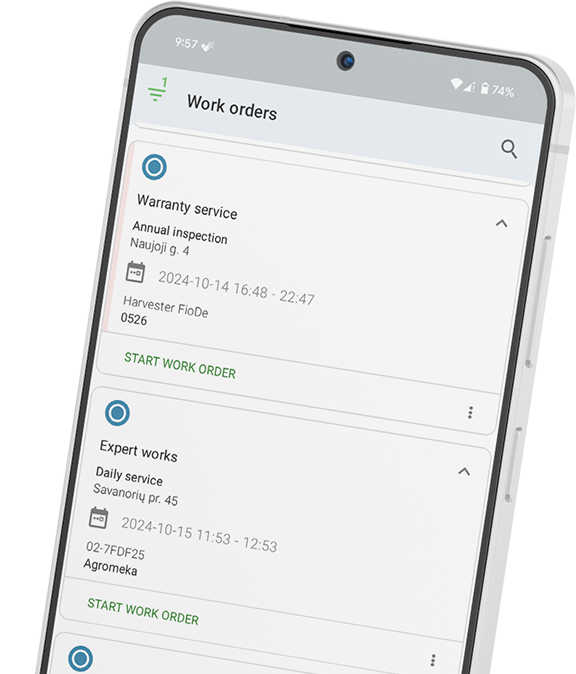Bring simplicity to your field service operations.
Our list of integrations is updated frequently. Explore each integration in its own separate page for more information.
Field service management success starts from within the company. No matter how many leads there are in your sales pipeline or how much you up your marketing spending, none of it matters if your operational processes are not buttoned up. FSM solutions come with a wide array of features to help you deal that but none of it is as important as smart scheduling.
Smart scheduling is an interactive and accessible way of optimizing the working schedules of your remote workforce. Back office and field technicians are on the same page about workload, status and specific location as they are able to access this information through a mobile app.
Smart scheduling can serve functions such as accept additional shifts, set a new appointment time, send alerts for new jobs, receive notifications with feedback from the client, and ultimately manage the working availability of your workforce.
While you can opt for a free scheduling software, it’s always better to make use of a smart scheduling solution within a comprehensive field service management ecosystem. Sure, the ability to optimize and view schedules is great, but the real value to your business comes from incorporating the benefits of the smart scheduling functionality, with all the other FSM benefits.
Smart scheduling technology gives you control over your workflow process, automating a lot of details that would otherwise be performed manually. Businesses that use smart scheduling solutions don’t only enjoy a more effective schedule, optimal times on appointments and easy way to manage employees but an overall improvement in productivity and customer satisfaction.
Here are the main benefits of smart scheduling:
Knowing where employees and vehicles are at all times allows operations managers to allocate tasks and projects accordingly. When it comes to Frontu, our collaboration with FleetComplete, gives this functionality even more depth and value.
The integration allows users to access details such vehicle model, license plate, and location, employee start and end time, duration in minutes, as well as a user’s trip history. The depth of data from this smart scheduling function is then stored onto the system, empowering the algorithm to make smarter suggestions about work allocation and appointment booking.
Smart scheduling is only possible if you can calculate factors such as a traffic and travel distance in order to choose the fastest route to get to the job site. Getting live traffic notifications allows your to adjust routes on the fly, and ensure projects are delivered at the most optimal times. Successful field service management businesses are the ones that balance the quality of the service delivered to customers with the speed of execution.
Staying true to scheduled appointments and maintaining high responsiveness to tasks no matter how busy the roads are is critical to achieving that success.
The ability to accurately measure task costs by calculating associated travel expenses, allows you to give your customers fairer and more transparent pricing. Not only can you optimize your spent by identifying spending trends, but you can also gain the trust of your customers by reflecting that in the price.
A service tracking software is a working ecosystem that goes well beyond the smart scheduling feature and what technicians do on their mobile applications. It’s a platform that gathers data and information about the way you work from end to finish, combines everything together and allows you to makes informed, data-driven decisions for the future.
The depth of information you gather on a platform like Frontu, creates the foundation for progress and improvement.
An automated customer profile gives you all the information you need to progressively offer a higher level of service to your customers. Creating customer profiles manually would have taken ages, taking up a lot of your time and resources. Frontu can automatically pull information like names, address, task history, steps, alterations, customer feedback and preferences, as well as best practice tips and scheduling details.
Every time you work with that client you have an even richer profile and a more detailed idea of what they like, what they don’t and what can be done to get projects over the line faster. Remember when we mentioned earlier in the article that the real value of smart scheduling comes from leveraging the greater field service management software environment? This is a great example of proving that.
Smart scheduling does make the day-to-day operations much easier and incredibly more efficient, but the long-term effects of its use are much more important to businesses. The more information you gather from a smart scheduling feature, the richer your data bank becomes, increasing your ability to make correct decisions.
According to Verizon Connect’s Fleet Technology Trends report, 38% of participants coined scheduling and dispatching inefficiencies as the biggest challenge facing their business. The same report highlights that 50% of fleet managers believe that the ability to swiftly reroute field technicians for emergency jobs is the most important factor in their success. Second place comes the ability to keeping everyone updated on schedule changes with 48%.
Smart scheduling is not a nice feature to have to simply digitalise your scheduling operations. This is a foundational piece in addressing company-wide pain points and empowering both managers and technicians to be better at what they do.

Our list of integrations is updated frequently. Explore each integration in its own separate page for more information.

Link copied!